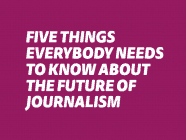The old adage: “If it bleeds, it leads” is still embraced by many large news outlets, with stories of war, disease and scandals dominating headlines. Yet the public still has a thirst for positive news, according to Charlie Beckett, a former BBC news editor now Professor of Media and Communications at the London School of Economics.
“Through relentless stories of war, killings, disease and scandals, the world is presented as a darker place than it actually is,” Beckett said in a recent radio documentary, “Good News Is No News”. There’s often an innate sense that something doesn’t have news value unless it’s “broken or violent.”
“In fact the human race has never been healthier, wealthier or more peaceful,” said Beckett: “The news says it tells the world as it really is, but it can feel like a nightmare, a negative image of real life.”
Beckett’s documentary was aired the same month that the Huffington Post founder, Arianna Huffington launched HuffPost Good News, the latest in a growing number dedicated to news with a positive spin. Others include The Good News Network, Positive News and sunnyskyz.com.
Does “good news” give the public a more nuanced view?
Beckett believes that when the people are fed a media diet of violence and crime they tune out, become desensitized or feel overcome with the depressing sense that they don’t have the ability to change anything.
Whether they are tuning in to bad news by choice or morbid compulsion, media consumers are bombarded daily with reports about recent events, such as Malaysia Airlines, Charlie Hebdo, or Boko Haram. In the past, people could remember the exact location they were when they heard about a tragedy, now there are too many to count.
While it’s important that the public knows what is occurring in the world around them, coverage is often unbalanced. In some parts of the world, such as West Africa, negative news dwarfs the positive. Coverage of the ebola virus has far outweighed stories of entrepreneurship and the rising middle class, Beckett said.
News is news for a reason
Yet the news can simply reflect a gloomy world, according to Tony Gallagher, deputy editor of The Daily Mail. News by its nature is out of the ordinary, and that tends to be unusual or disastrous. “We are competing for people’s time and attention, and the reality is that bad news does sell,” he said.
Still, Gallagher admits that, while crime is going down, it’s not possible to know this from reading a newspaper. The Daily Mail still covers the same number of crimes and murder trials, meaning there’s “a danger” that the paper isn’t reflecting what is really happening in the world.
However a diet of positive news could make readers feel like they live in a “boring world”, not one that perhaps to the average person feels like a scene out of a crime thriller.
“The news is gritty, it’s gloomy, it’s exciting, [the readers] want to be surprised by what they are reading,” Gallagher said.
Good news is not always “fluffy”
Some people still equate good news with “fluff” — such as pictures of cute kittens — or a press release spiel that masks the real truth with flowery prose. Beckett referred to Martyn Lewis, a former BBC news reader. In the early 1990s Lewis was vilified by his peers when he pushed for more positive news — even though his intent was simply to balance, rather than water down, coverage.
The Huffington Post’s recently launched good news section aims to tell positive stories, but with the same care as more negative news stories. Headlines proclaim “Struggling single mom of four wins $180m on Powerball,” and “Homeless and in Love.”
“The stories about dogs and kittens are the low-hanging fruit. It’s really about the truth,” Arianna Huffington said. “If we don’t cover positive stories with the same relentlessness and resources that we cover the negative stories, then we are giving readers a very jaundiced view of human nature. It’s changing.”
Producing more thorough and positive news
News is increasingly being shared through social outlets — on The Huffington Post positive stories are shared three times more than the negative ones.
The question journalists should ask is how to produce positive news that is still thorough and true. Positive News, a UK website, has been operating for 10 years, and runs workshops for journalists. Like other news outlets, it aims to showcase what’s really happening in the world, but with a more upbeat spin. The site is replete with titles such as “Low-income Croatians given ‘fresh start’ as debts wiped” and “Binge drinking continues to fall in young UK adults.”
Good news, concluded Beckett, should not equate to less critical or independent journalism. Rather, it should mean a more accurate, solutions-driven representation of society, and more choices for the news consumer.
Photo credit: Ryan Forsythe / Flickr Cc
Tags: Charlie Becket, good news, HuffPost Good News, Journalism, kitten, London School of Economics, need for good news, News, positive news











































